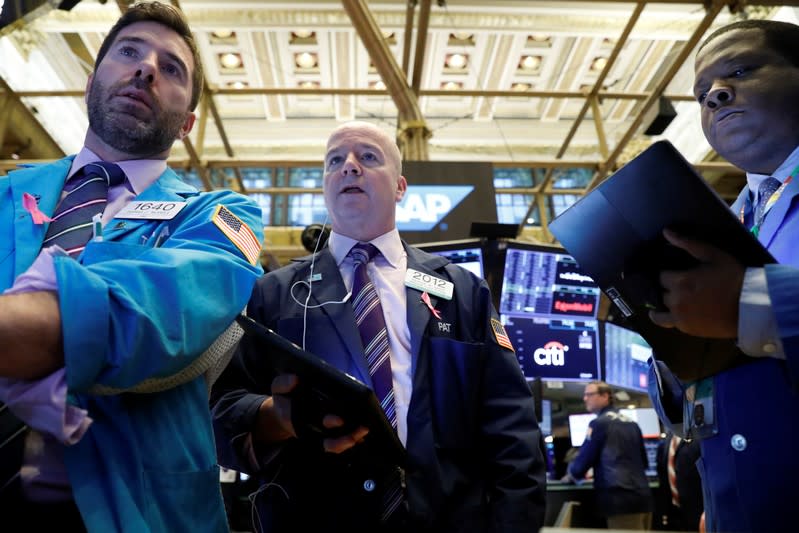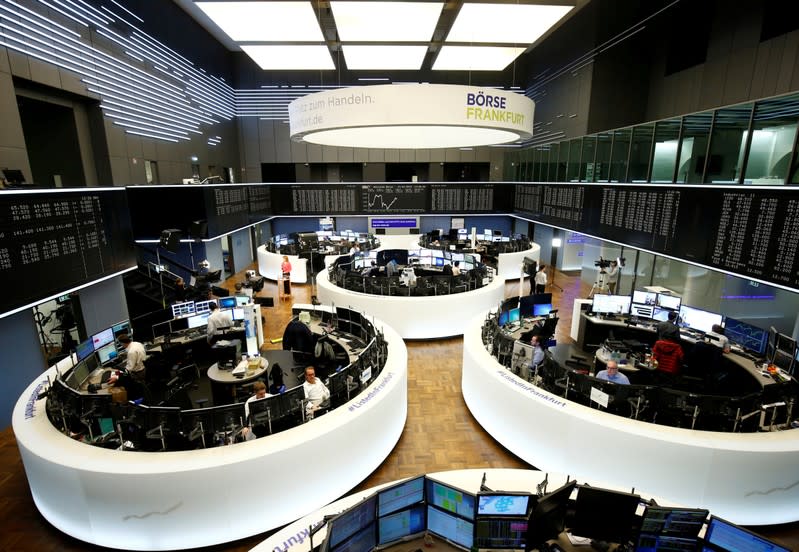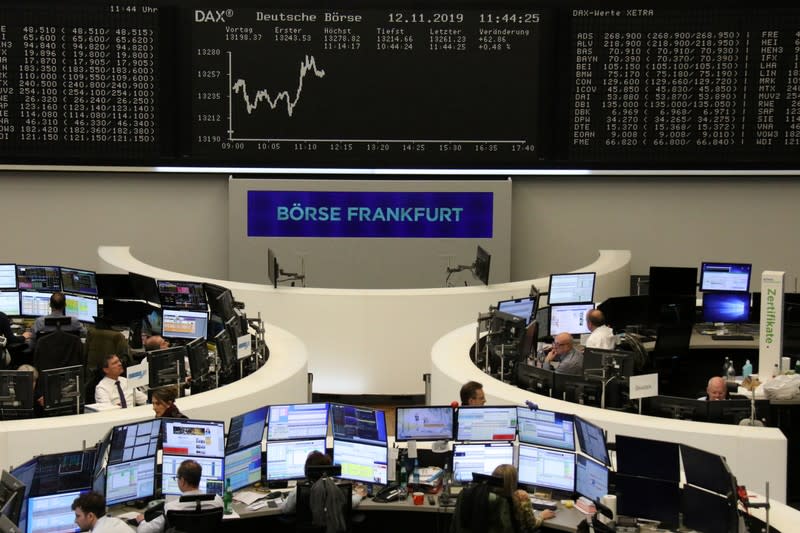Shares, bond yields slip on sour trade deal sentiment
By Herbert Lash
NEW YORK (Reuters) - Global equity markets and government bond yields fell on Wednesday on growing doubts that a U.S.-China trade deal can be reached soon and fears that unrest in Hong Kong may lead to a Chinese crackdown.
The day after U.S. President Donald Trump warned Washington would raise tariffs on Chinese goods "very substantially" without a deal, trade uncertainty pushed investors to park funds in safe havens. This boosted gold prices as well as the Swiss franc, Japanese yen and government debt.
A measure of emerging market currencies and an index of emerging market equities both registered their largest single-day declines in almost three months.
The dollar was stable after a sharper-than-expected rise in U.S. consumer prices and an upbeat economic outlook from Federal Reserve Chair Jerome Powell.
"It seems overnight there were a lot more fears that the U.S. and China were further apart on the trade deal than initially suggested," said Gennadiy Goldberg, an interest rate strategist at TD Securities in New York.
Powell said he saw "sustained expansion" ahead for the U.S. economy, with low unemployment boosting household spending and the full impact of the three interest rate cuts in the past three months still to be felt.
U.S. stocks traded close to break-even but an improving economic outlook helped the benchmark S&P 500 index to eke out a closing record high. The Dow Jones industrials rose on a 7.3% jump in Walt Disney Co <DIS.N> shares.
Stocks had retreated in afternoon trading after the Wall Street Journal reported the U.S.-China trade negotiations have hit a snag over farm purchases.
Recession fears have lessened, which has helped widen the spread between short- and long-term Treasury yields, said Joseph LaVorgna, chief economist for the Americas at French bank Natixis in New York.
"You're going to see the market move higher. We're going to consolidate and move higher because the fundamentals are pretty solid and that means that you're going to get 10-year notes up over 2%," LaVorgna said.
MSCI's gauge of stocks across the globe <.MIWD00000PUS> shed 0.21%, while the FTSEurofirst 300 index <.FTEU3> of leading European shares closed down 0.2%. Stocks on Wall Streets traded either side of break-even.
The Dow Jones Industrial Average <.DJI> rose 92.1 points, or 0.33%, to 27,783.59 and the S&P 500 <.SPX> gained 2.2 points, or 0.07%, to 3,094.04. The Nasdaq Composite <.IXIC> dropped 3.99 points, or 0.05%, to 8,482.10.
Emerging markets were hammered as anti-government protesters dug in across Hong Kong and set the stage for further confrontation as police said violence in the city had reached a "very dangerous and even deadly level."
MSCI's emerging markets equity index <.MSCIEF> lost 1.16% and its emerging markets currency index <.MIEM00000CUS> fell 0.39%, both their biggest one-day declines since late August.
The Swiss franc <CHF=> rallied to a one-month high against the euro as hedge funds unwound some of their negative bets against the currency and as appetite for risky assets faltered due to the intensifying unrest in Hong Kong.
Against the euro <EURCHF=>, the franc gained as much as 0.5% versus the euro to 1.0881 francs per euro, strengthening to its highest levels since Oct. 9 while it gained by almost a similar margin against the dollar.
The dollar index <.DXY> rose 0.05%, with the euro <EUR=> down 0.05% to $1.1001. The Japanese yen <JPY=> strengthened 0.19% versus the greenback at 108.82 per dollar.
Oil prices reversed early losses after the Organization of the Petroleum Exporting Countries said it saw no signs of global recession and that U.S. shale oil production could grow by much less than expected in 2020.
Brent crude futures <LCOc1> rose 31 cents to settle at $62.37 a barrel, while U.S. West Texas Intermediate crude <CLc1> settled up 32 cents at $57.12 a barrel.
U.S. gold futures <GCcv1> settled up 0.7% at $1,463.30 an ounce.
Benchmark 10-year U.S. Treasury notes <US10YT=RR> rose 6/32 in price to push their yield down to 1.8860%.
Bond yields in the euro zone fell on fears about the trade outlook.
Benchmark 10-year German government bond yields fell the most for a day since June, down 6 basis points at -0.3%. Most euro zone 10-year bond yields fell 4 to 6 basis points on the day <DE10YT=RR> <NL10YT=RR> <FR10YT=RR>.
(Reporting by Herbert Lash, additional reporting by Karen Brettell in New York; Editing by Dan Grebler and Tom Brown)

 Yahoo News
Yahoo News 


